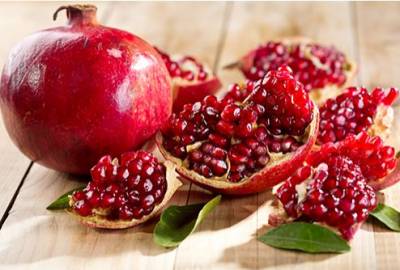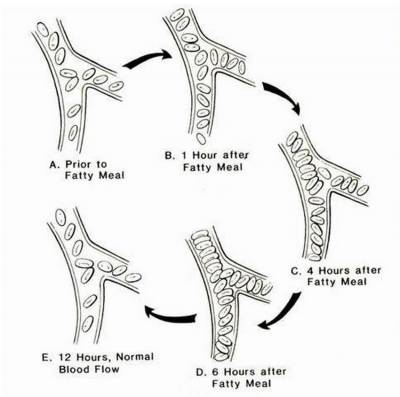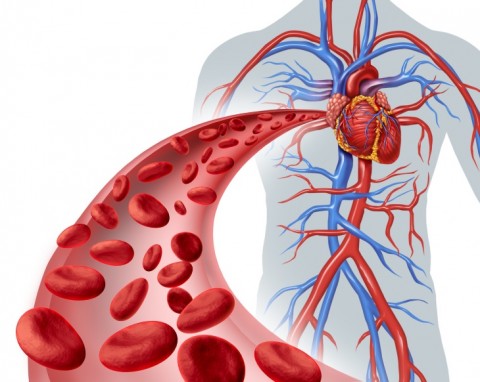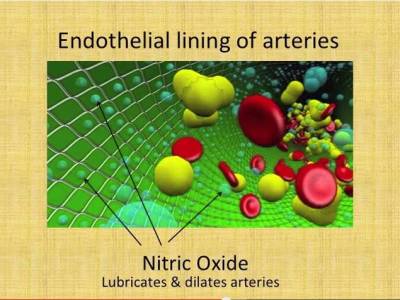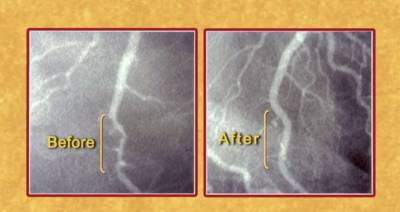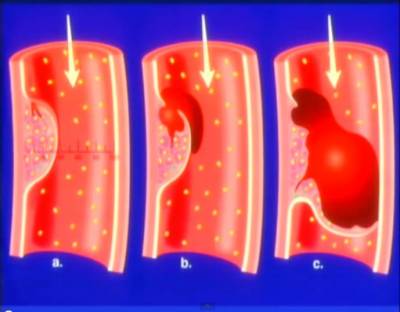Pomegranate season is here! This beautiful fruit provides numerous health benefits and can be used to embellish many holiday dishes. According to two of Dr. Joel Fuhrman's articles, the time spent seeding this fruit is well worth it. The phytochemical compounds in pomegranates are the most "powerful anti-oxidant of all fruits" and supports a healthy...
DrCarney.com Blog
Have you ever met your friends at your favorite restaurant and when you returned home, you felt too sluggish or sleepy to be productive, so you crashed on the sofa to watch TV? This phenomenon is not a surprise to Dr. John McDougall, who has been studying the effects of high-fat meals for over 40...
In 1998, a pivotal discovery earning the Nobel Prize in Medicine, led to the discovery of a "miracle molecule" called Nitric Oxide (NO). The Nitric Oxide molecule is a gas which is produced inside the endothelial lining of all blood vessels. The endothelial layer is a thin layer which forms a barrier between the flowing...
If you've already decided what you're making for dinner, did any of the following points guide your decision - taste preference, convenience, familiarity, and nutritional or religious/ethical beliefs? Because most people don't have the time or interest in studying the scientific literature, our nutritional beliefs (especially those regarding animal products) are formed without giving them...
It's exciting to see more doctors learning how dietary excellence plays a major role in the prevention and reversal of disease! Dr. Kim A. Williams, a cardiologist at Rush University in Chicago (and the next president of the American College of Cardiology), has embraced a whole-food, plant-based diet and now recommends it to his patients....
Losing a child is every parent's worst fear. No one would argue that nurturing and protecting our children to the best of our ability should be one of our highest priorities. We make sure our children get enough sleep, do their homework, brush their teeth, limit their TV exposure, and enroll them in sports. Yet...
Losing a child is every parent's worst fear. No one would argue that nurturing and protecting our children to the best of our ability should be one of our highest priorities. We make sure our children get enough sleep, do their homework, brush their teeth, limit their TV exposure, and enroll them in sports. Yet...
We are pleased to see more physicians incorporating diet, lifestyle, and preventive medicine into their medical practice. Dr. Shane Williams, a community cardiologist in Bracebridge Muskoka, Ontario is one such specialist. Dr. Williams has been eating a vegan diet since 2010 and has been using this same approach with his cardiac patients. In 2011 he...
If you're familiar with Dr. Caldwell Esselstyn Jr., world famous and renowned author of Prevent and Reverse Heart Disease, then you're familiar with the term "edothelial cells" and the role these cells play in the prevention of heart disease. The video below is a two-minute clip from the powerful documentary Forks Over Knives. Scientists discovered...
Scrambled, fried, hard boiled, or poached - there's a way to prepare eggs to satisfy even the pickiest of eaters. I'm sure many people have fond memories of eating bacon and eggs for breakfast with their families on weekend mornings. Eggs are heavily advertised as being an excellent source of protein, vitamins, minerals, and antioxidants...
"Let food be thy medicine and medicine be thy food." These are wise words spoken by Hippocrates, an ancient Greek physician, that is "considered one of the most outstanding figures in the history of medicine." The Hippocratic Oath which is named after Hippocrates, outlines medical ethics for doctors and is still used today. Part of the oath reads: "I will prescribe regimens for the good of my patients according to my ability and my judgment and never do harm to anyone."
Sadly though, "medical care and errors" has become the third leading cause of death in the U.S. It is estimated that over 400,000 deaths per year are associated with medical error. Examples of this include infections in hospitals, unnecessary surgery, hospital errors, adverse reactions and interactions to prescription drugs, administration of the wrong drug to the wrong patient, and wrong diagnosis. The good news is that we can avoid many of these unnecessary treatments contributing to these statistics when we eat a health-supporting diet.
The statistics are distressing. Heart disease is our nation's leading cause of death for both men and women, resulting in a heart attack every 34 seconds. Eighty-one million Americans suffer from cardiovascular disease killing one out of every three people or 831,000 each year.
Will you be next? You may not have any symptoms of heart disease, or have been told that your cholesterol is within the "normal" range, yet these measures are not an accurate means of assessing your risk for heart disease. The majority of heart attacks occur in patients whose cholesterol is between "the normal range" of 150-200. In order to be truly protected, we should strive to maintain a total cholesterol level below 150. Heart disease is very rare in those with cholesterol levels this low.

